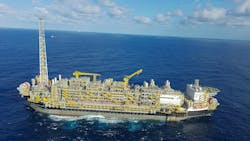Petrobras produces first oil from new Mero FPSO
Petróleo Brasileiro SA (Petrobras) started producing oil from the Marechal Duque de Caxias (Mero 3) FPSO in Mero field in the presalt Santos basin, offshore Brazil.
The ultra-deepwater unit has the capacity to produce up to 180,000 b/d of oil and compress up to 12 million cu m/d of gas. The FPSO will increase Mero’s installed production capacity to 590,000 b/d from 410,000 b/d, the operator said in a release Oct. 30.
The unit is part of Mero’s fourth production system and was chartered from MISC Group.
Altogether, there will be 15 wells—8 producer wells and 7 water and gas injection wells—connected to the vessel through undersea infrastructure. The project has been designed to minimize greenhouse gas emissions, with reinjection of the associated gas into the reservoir and zero routine flaring, said partner TotalEnergies in a separate release.
The FPSO will later be connected to high pressure subsea separation technology equipment in a pilot project to separate oil from CO2-rich gas at the bottom of the ocean and reinject the gas directly into the reservoir. The technology is expected to be operational as of 2028, TotalEnergies said (OGJ Online, Jan. 8, 2024).
The Pioneiro de Libra FPSO, Guanabara (Mero 1) FPSO, and Sepetiba (Mero 2) FPSO are already operating in the field. An additional development phase of 180,000 b/d, Mero-4, is under construction, with a start-up expected in 2025.
The FPSO is chartered to Petrobras on behalf of the Libra Consortium, which develop the Mero unitized field, operated by Petrobras (38.6%) in partnership with Shell Brasil (19.3%), TotalEnergies (19.3%), CNPC (9.65%), CNOOC (9.65%), and Pré-Sal Petróleo S.A. (PPSA) (3.5%), representing the Government in the non-contracted area.
About the Author
Alex Procyk
Upstream Editor
Alex Procyk is Upstream Editor at Oil & Gas Journal. He has also served as a principal technical professional at Halliburton and as a completion engineer at ConocoPhillips. He holds a BS in chemistry (1987) from Kent State University and a PhD in chemistry (1992) from Carnegie Mellon University. He is a member of the Society of Petroleum Engineers (SPE).

